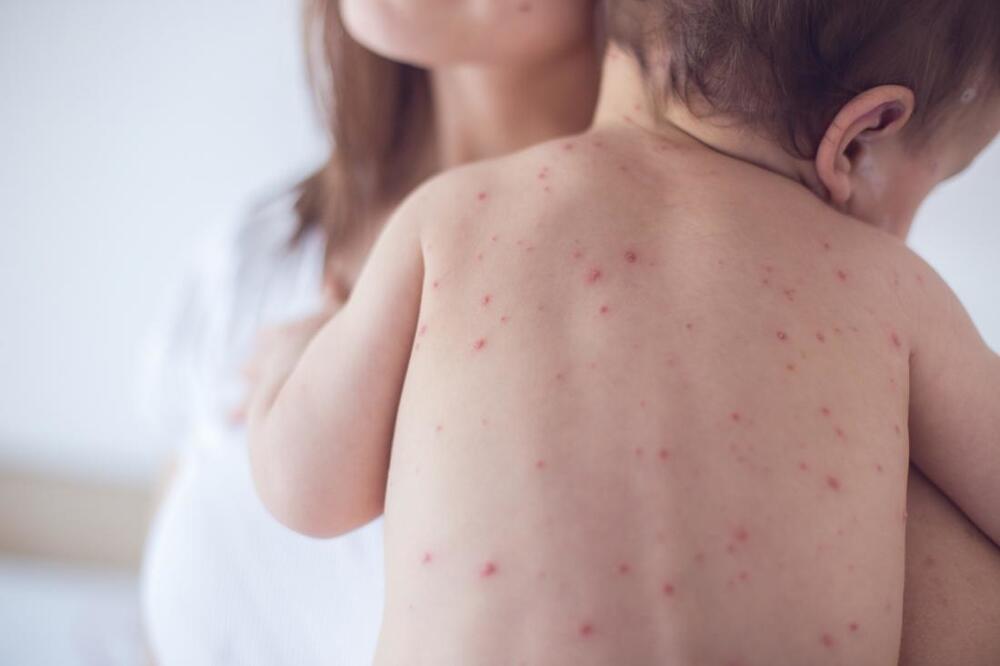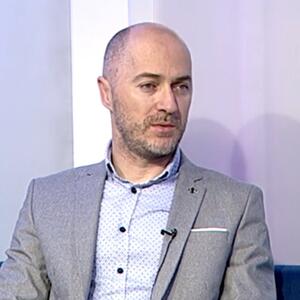The hygiene-epidemiological service of the Bar Health Center, in cooperation with the Institute for Public Health (IJZ), yesterday, a day after the discovery of the first case of measles, asked the school attended by the sick child for the names of the students and checked their vaccination status.
According to "Vijesti" unofficial information, classes at Elementary School "Yugoslavia" went smoothly yesterday despite the appearance of smallpox, and the Ministry of Education, Science and Innovation (MPNI) sent schools a guide for research and action in case of an epidemic of this infectious disease.
At yesterday's press conference at the IJZ, it was announced that the sick child, along with about 60 other children and a dozen coaches, stayed in Sarajevo on March 9 and 10, and that it was an imported case of the disease.
Measles arrived from Sarajevo, where the epidemic is raging
Head of the department for immunoprophylaxis at the IJZ, epidemiologist Adis Martinovic he said that the child developed the first symptom, a fever, on March 22, and after a few days a rash, so he was tested for measles.
"The pediatric service in Bar has taken all necessary measures to check all contacts, they are all under surveillance," said Martinović.
When asked what surveillance entails and whether the contacts are in self-isolation, Martinović said that it is not self-isolation and that they can move around, but that they have an obligation to report in case of symptoms.
A child from Bar who was ill with smallpox was isolated in time, the director of the IJZ assessed yesterday Dragan Laušević and clarified that all contacts of the sick child are being investigated.
"In addition to vaccination, we will have to apply some anti-epidemic measures. That's why the best thing is when we have a safe and effective vaccine", said Laušević, emphasizing that the vaccine is effective and safe and has been used for 60 years.
Speaking about the nature of the smallpox infection, he said that the problem is that an infected person can spread the infection a few days before the appearance of smallpox.
"It is difficult to control, which is why the only real measure is vaccination," said Laušević and explained that one sick person can infect 12 to 13 people.
Laušević emphasized that during the last year in Europe, cases of smallpox were registered in almost all countries, a total of almost 60.000 new cases.
He said that the European Union (EU) has the highest number of cases now among adults, but the greatest risks of complications and death are among infants.
He said that almost a thousand patients were registered in the Federation of Bosnia and Herzegovina, of which 630 were in Sarajevo.
"Our infection was imported from Sarajevo, where the infected child was staying," Laušević said.
He emphasized that epidemics of smallpox are recorded everywhere in the surrounding countries, which is why they warned that it is only a matter of time when it will happen in Montenegro.
Laušević said that almost 27 children did not receive the first dose, and another 20 did not receive the second dose.
As he stated, at the moment when the epidemic "breaks out" in Montenegro, it is published on all websites in the world and it is potentially suggested that Montenegro is a risky place, which can threaten the summer tourist season.
Unvaccinated children are removed from schools
In the guide that was delivered to schools, it is written that in the event of the appearance of measles patients in educational institutions, all children who have not been vaccinated in accordance with the age and vaccination calendar, the decision of the health and sanitary inspection prevents them from attending kindergarten or classes in schools until the end of two the maximum incubation period since the last case in that institution.
It is necessary to organize online classes for children in primary and secondary school who cannot physically attend classes for this reason.
"Children who are prevented from attending classes on this basis, if they undergo vaccination, it is possible to return to regular attendance," the guide says.
In the event of an epidemic, the Ministry of Health will announce the specified measures from the guide through an order, and the control of implementation is the responsibility of the Directorate for Inspection Affairs.
The guide to schools states that the initial treatment for suspected smallpox is very similar to that for other respiratory infectious diseases, so it is crucial that children with symptoms such as sneezing, cough, fever, red eyes, general weakness and rashes do not physically attend classes. .
If symptoms or signs of illness develop during classes, it is necessary to move the child to a separate room and immediately call the parents to take him over, and that room should be thoroughly ventilated and disinfected.
It is necessary for schools to contact the competent epidemiological service of the Health Center or IJZ, and susceptible contacts should be vaccinated as soon as possible.
"In a situation where a person has already been in contact with a sick person, vaccination carried out in the first three days after exposure can help prevent the onset of symptoms or alleviate the course of the disease," the guide says, among other things.
It is stated that during the incubation period, which is seven to 21 days after contact with a sick person, sensitive children who were in contact should not attend school and kindergarten, nor go to gatherings such as birthdays, celebrations, plays...
What do the IJZ guidelines say?
According to the IJZ guide, the definition of a measles epidemic is two or more laboratory-proven and temporally linked cases of measles that are epidemiologically or virologically related.
The guide says that it is desirable to form a multisectoral team, a working group, to coordinate activities at the appropriate administrative level, most often municipalities, in order to strengthen capacities and improve the possibilities of a timely response to the measles epidemic.
All suspected cases should be adequately investigated and all possible contacts identified, and the investigation should begin without delay and ideally within the first 48 hours after the establishment of suspicion of measles.
In the guidelines, among other things, it is written that persons who were in contact with a sick person during the infectious period, i.e. four days before and four days after the outbreak of smallpox, should be identified and put under increased surveillance.
"Susceptible contacts, who have no medical contraindications and are of an appropriate age, should be vaccinated with measles vaccine as soon as possible. Even in a situation where a person who was in contact with a sick person is already infected, vaccination carried out in the first three days after infection can help alleviate the course of the disease and prevent the appearance of symptoms," the guide states.
According to the authorities, Montenegro currently has a sufficient amount of vaccine against smallpox.
Bonus video:





